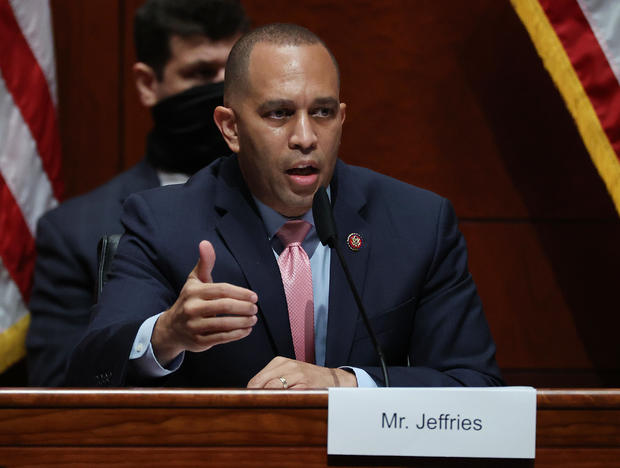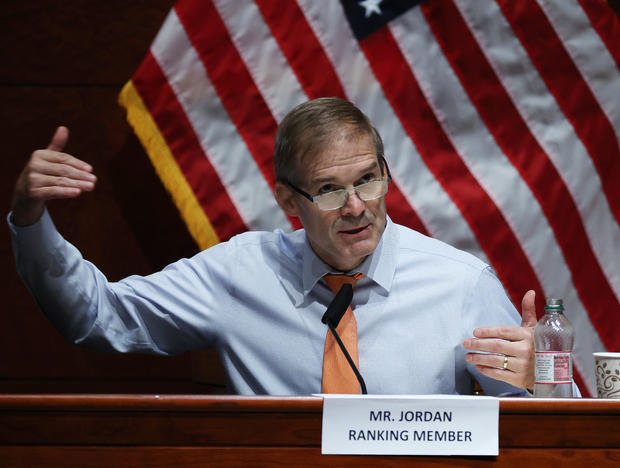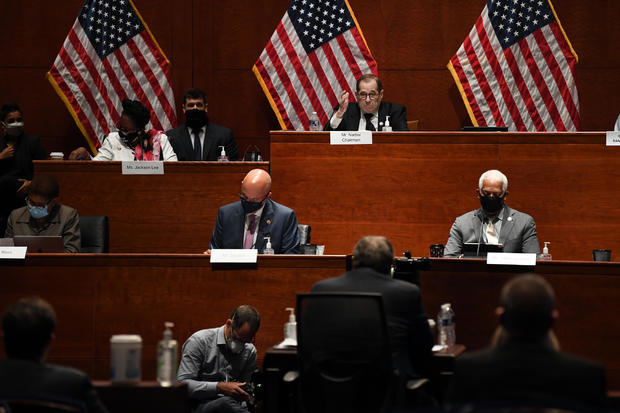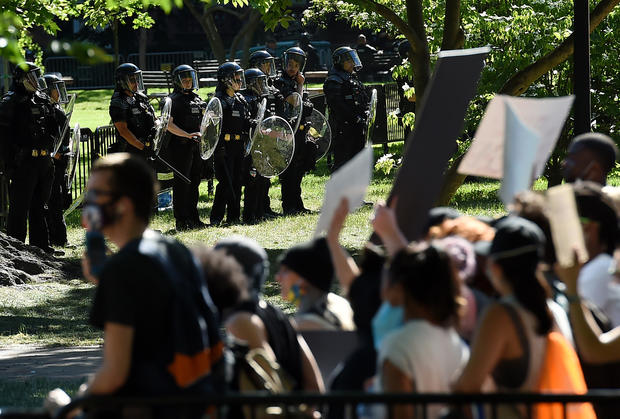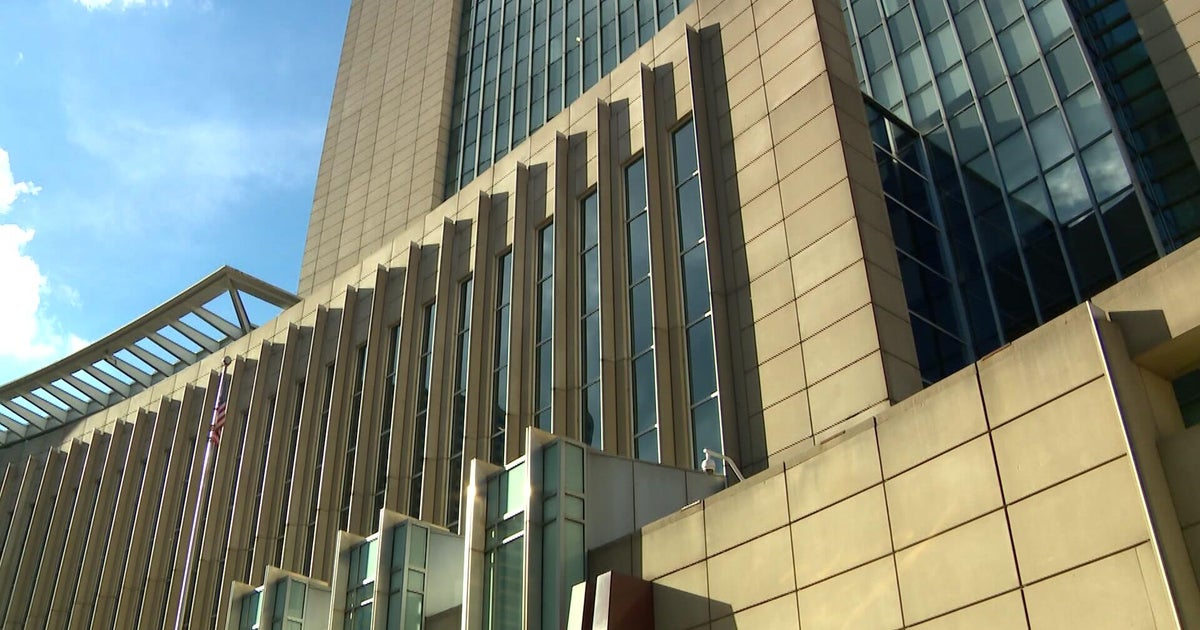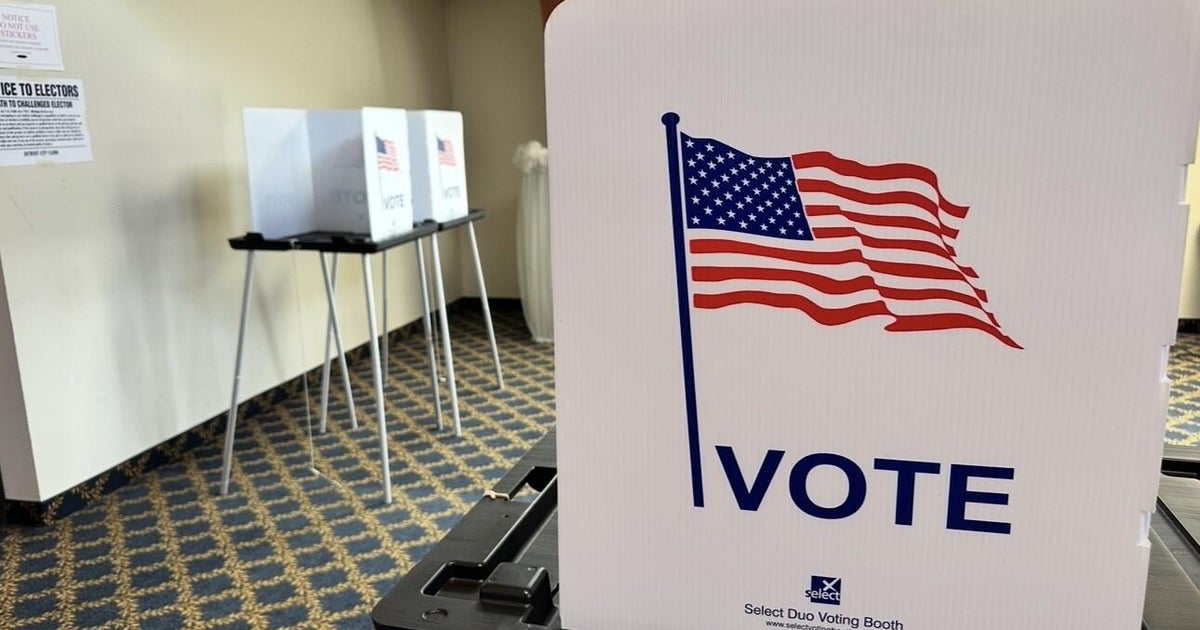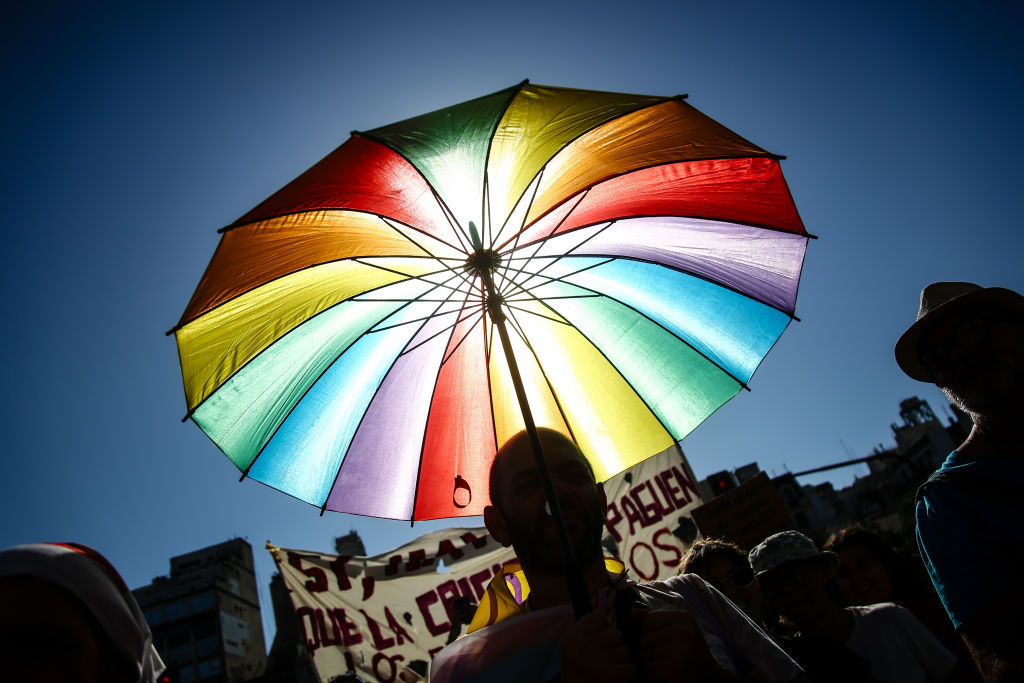Tensions between Barr and House Judiciary Committee come to head in contentious hearing
Washington — Attorney General William Barr on Tuesday faced the House Judiciary Committee for the first time in a contentious hearing that covered a range of matters involving the Justice Department, from its treatment of cases involving two of President Trump's associates, to the federal response to protests in Washington, D.C., and Portland, to election integrity and vote-by-mail in the November election.
Barr was peppered with questions from the committee for more than five hours, across which exchanges between the attorney general and Democrats became laden with sarcastic quips and partisan jabs.
"You are a real class act," Barr sarcastically told Chairman Jerrold Nadler after the congressman denied his request for a five-minute break as the hearing neared its end.
"Reclaiming my time" was employed frequently by Democrats as they pressed Barr on whether he was doing Mr. Trump's bidding in federal cases involving Roger Stone and Michael Flynn and questioned him on the deployment of federal officers to U.S. cities to quell unrest.
Barr made clear his displeasure with Democrats from the outset, saying in his written opening statement that they "have attempted to discredit me by conjuring up a narrative that I am simply the president's factotum who disposes of criminal cases according to his instructions."
Read more:
- Barr goes head-to-head with Jayapal over administration's handling of protesters
- Barr undercuts National Guard commander's assessment of Lafayette Square protests
- Sheila Jackson Lee: "You seem to have a difficult time understanding systematic racism and institutional racism"
- Nadler says Barr has "aided and abetted the worst failings" of President Trump
Hearing concludes
Barr won't commit to withholding Durham report until after November election
Congresswoman Debbie Mucarsel-Powell, a Democrat from Florida, asked the attorney general whether he would commit to not releasing any report from U.S. Attorney John Durham before the November presidential election. Barr said he would not commit to withholding the report until after voters head to the polls.
Durham, the top federal prosecutor in Connecticut, was tapped by Barr to conduct a sweeping probe into the origins of the Russia investigation.
"We're not going to interfere," Barr told lawmakers of the Justice Department. "In fact, I've made it very clear that I'm not going to tolerate it."
The attorney general said any report released in the lead-up to the election "will be in my judgment not one that is covered" by Justice Department policy against taking investigative moves that could disrupt an election.
Barr goes head-to-head with Jayapal over administration's handling of protesters
Congresswoman Pramila Jayapal lambasted Barr over the Trump administration's disparate treatment of protesters who descended on state capitals demanding governors lift restrictions related to the coronavirus pandemic and demonstrators who are protesting police brutality and racial injustice, which has led to the deployment of federal officers to U.S. cities.
"There is a real discrepancy in how you react as the attorney general, the top cop in this country, when White men with swastikas storm a government building with guns, there is no need for the president to 'activate' you, because they're getting the president's personal agenda done," Jayapal told Barr. "But when Black people and people of color protest police brutality, systemic racism and the president's very own lack of response to those critical issues, then you forcibly remove them with armed federal officers, pepper bombs because they are considered terrorists by the president."
Jayapal referenced a phone call Mr. Trump had with governors regarding how to handle the protests when they turn violent, in which he urged them to "get tougher" and "dominate." The president also warned governors he would "activate" Barr.
Barr said he is aware of protests with regards to the federal government.
"I have a responsibility for the federal government and the White House is the seat of the executive branch," he said.
Barr continued to deny that officers in Lafayette Square used tear gas to disperse protesters and said it is his "understanding" it was not used despite reports to the contrary.
Barr undercuts National Guard commander's assessment of Lafayette Square protests
Barr contradicted testimony from National Guard commander Adam DeMarco, who said in a separate hearing before a Congressional committee on Tuesday that law enforcement treatment of peaceful protesters outside the White House on June 1 was "deeply disturbing."
"At no time did I feel threatened by protesters or assess them to be violent. My observation use of force was unnecessary escalation of use of force," DeMarco said in testimony before the House Natural Resources Committee.
However, Barr said that he did not recall DeMarco being involved in deciding how to respond to the Lafayette Square protesters. He also undercut DeMarco by implying that the National Guard commander was a partisan actor.
"I don't remember Captain DeMarco, who is the same Captain DeMarco who ran as a Democratic candidate for Congress in Maryland, was even close" to making decisions on the matter, Barr said.
Congresswoman Pramila Jayapal challenged Barr on why white nationalist protesters in Michigan earlier this spring did not face a federal response. Barr said that was a matter for the states, and argued that it was his responsibility to protect federal property.
Barr confirms Secret Service recommended Trump go to White House shelter because of escalating protests
In discussing the controversial clearing of Lafayette Square on June 1, Barr confirmed to lawmakers that as protests became more destructive across several days in late May, the Secret Service recommended Mr. Trump go down into the shelter in the White House, as has been reported.
Barr's confirmation stands in contrast to the president's characterization of events, as Mr. Trump has said he went into the bunker for an "inspection" and was there for a short period of time.
The attorney general said that across a three-day span at the end of May, leading up to the clash in Lafayette Square, "there was unprecedented rioting around the White House."
Barr estimated 90 officers with the Secret Service and U.S. Park Police were injured in clashes with protesters, some of whom suffered concussions. One was operated on, he said.
The attorney general again said law enforcement cleared Lafayette Square to expand the perimeter around the White House and that the intention was to do so before there was a "big build up of demonstrators."
"This was something conceived of long before and didn't turn on the nature of the crowd although I would say the crowd was very unruly," he said.
Despite Barr's insistence the forceful removal of the protesters was to offer more of a buffer in front of the White House, there have been questions as to whether they were cleared so Mr. Trump could walk to St. John's Church for photos. Barr said earlier in the hearing he learned the president may be leaving the White House in the "afternoon" of June 1, but did not offer a specific time.
Barr discusses election security ahead of November election
Democratic Congressman Cedric Richmond asked Barr about election security and mail-in voting, challenging the attorney general on whether widespread voter fraud would be an issue in November as President Trump has alleged.
Barr said that he had "no reason to believe" that the November election would be "rigged," which the president has suggested.
Barr later told Congressman Hakeem Jeffries that if Mr. Trump lost the election but refused to leave office, he would leave office anyway "if the results are clear."
However, Barr appeared to agree with the president on the likelihood of voter fraud if there is widespread mail-in voting.
Barr said he thought "there's a high risk" voter fraud would increase if there is mail-in voting in November. Richmond noted there are significant concerns about in-person voting due to the coronavirus pandemic, particularly in the African American community, which has seen disproportionate deaths from the virus. Evidence suggests that voter fraud is extremely rare.
In an attempt to press Barr on the issue of systemic racism, Richmond asked Barr to provide his office with data on how many Black staffers are in the Department of Justice.
Barr also said that he believed Russia interfered in the 2016 election, and would likely attempt to interfere in 2020.
Barr defends less stringent sentencing recommendation for Roger Stone
Barr was pressed by Congressman Hank Johnson, a Democrat from Georgia, about the change in Stone's sentencing recommendation, which was viewed by critics as inappropriate intervention by senior Justice Department officials to benefit a friend of Mr. Trump.
"Do you think it's fair for a 67-year-old man to be sent to prison for seven to nine years?" Barr asked, as the exchange with Johnson grew more heated.
The attorney general said he did not discuss the lighter sentencing recommendation for Stone with anyone at the White House or outside the Justice Department, and told the panel that while the initial recommendation of seven to nine years was within the sentencing guidelines, it strayed from department policy in his view.
Johnson also criticized Barr for his opening statement. He said it read "like it was written by Alex Jones or Roger Stone." In laying out the timeline for the change in Stone's sentencing recommendation, Johnson said the recommendation from federal prosecutors was made in the morning, after which Mr. Trump tweeted his displeasure with it. Then, the Justice Department recommended Stone receive a lighter sentence.
"You think the American people don't understand you were carrying out Trump's will?" Johnson asked. He noted that while Barr served as attorney general for President George H.W. Bush, he never intervened in a sentencing recommendation for the president's friend.
Barr went on to defend the lighter sentencing recommendation and said despite knowing he would receive criticism, "my obligation is to be fair to the individual."
"At the end of the day, the pudding is in the eating," he said, noting the judge presiding over the case, Judge Amy Berman Jackson, said she would not have agreed with the initial recommendation.
Sheila Jackson Lee: "You seem to have a difficult time understanding systemic racism and institutional racism"
Congresswoman Sheila Jackson Lee of Texas challenged Barr on his understanding of racism and how it affects American institutions, telling him: "You seem to have a difficult time understanding systemic racism and institutional racism."
She asked Barr if the Trump administration intended to end systemic racism. He said yes, but only "to the extent there is racism in any of our institutions in this country and in the police."
"I don't agree that there's systemic racism in police departments," Barr said. He argued in favor of reforming police training instead of conducting more detailed pattern-or-practice investigations into police departments.
Barr defends federal presence in cities by detailing tactics used by Portland protesters
The attorney general said protesters outside the federal courthouse in Portland have used pellet guns and slingshots to hurl projectiles that have wounded officers "to the bone," and utilized lasers to blind law enforcement.
Barr also confirmed to Congressman Steve Chabot, a Republican from Ohio, that demonstrators have been armed with rifles, explosives, rocks and bricks.
The attorney general defended the presence of federal law enforcement officers in Portland and said they are "not out looking for trouble."
"Since when is it OK to burn down a federal court?" he said, adding that the Trump administration is trying to "protect federal functions and federal buildings."
Barr says he's trying to depoliticize the Justice Department
Under questioning from Republican Congressman Mike Johnson, Barr said that he is trying to depoliticize the Justice Department.
"Actually what I've been trying to do is restore the rule of law," Barr said. In the cases against Michael Flynn and Roger Stone, he said he intervened in an attempt to "rectify the rule of law."
"I agree that the president's friends don't deserve special breaks but they also don't deserve to be treated more harshly than others. And sometimes that's a difficult decision to make, especially when you know you're going to be castigated for it," Barr said.
Barr intervened in the Stone case to ask for a lighter sentence, leading all four prosecutors in the case to abruptly withdraw.
Barr rejects claims DOJ diverted resources and personnel to boost Trump's reelection
Pressed by Nadler about whether existing Justice Department initiatives were rebranded under Operation Legend in an effort to help Mr. Trump's reelection prospects, Barr sought to clear up questions about the resources and law enforcement personnel that have been sent to U.S. cities to combat violent crime.
Barr told the committee that an anti-crime initiative launched in the fall, called Relentless Pursuit, was "squelched" because of the coronavirus pandemic. As a result, the Justice Department is set to send more officers to U.S. cities that are experiencing a spike in crime, which Mr. Trump announced alongside Barr last week.
"We have put in additional federal agents and investigators to help deal with it," he said.
Barr told lawmakers he rejects "the idea that the department has flooded anywhere and attempted to suppress demonstrators," as the Trump administration has been accused of doing in Portland.
Nadler also asked Barr whether he has discussed the 2020 campaign with Mr. Trump, but Barr said he would not divulge the details of his conversations with the president.
He acknowledged that as a member of the Cabinet, the topic of the upcoming election has been raised.
"The topic comes up in Cabinet meetings and other things," Barr said. "It shouldn't be a surprise that the topic of the election comes up."
Barr says Justice Department is independent from president
Barr skipped some paragraphs but otherwise hewed closely to the text of his prepared remarks in his opening statement, reiterating that the actions of the Department of Justice are independent from the president.
"I think it would be an oversimplification to treat the problem as rooted in some deep-seated racism generally infecting our police departments," Barr said of the treatment of African-Americans by police. "It seems far more likely that the problem stems from a complex mix of factors, which can be addressed with focused attention over time. We in law enforcement must be conscious of the concerns and ensure that we do not have two different systems of justice."
He also criticized the "demonization" of police officers, saying that it was "injurious" to public safety.
Read more here
Jordan says Democrats are targeting Barr for focusing on wrongdoing by Obama-era DOJ
Congressman Jim Jordan of Ohio, the top Republican on the committee, accused congressional Democrats of "attacking" Barr because he raised questions about the actions of the Obama administration during the 2016 presidential campaign.
"Spying, that one word," Jordan said at the outset of his opening remarks. "That's why they're after you Mr. Attorney General."
The Ohio Republican, a key Trump ally, walked through the timeline of the FBI's investigation into Russian meddling in the 2016 election and potential ties between the Trump campaign and Russia, followed by special counsel Robert Mueller's probe, and invoked former FBI agent Peter Strzok and former FBI Director Jim Comey, among other Obama-era Justice Department officials.
"You guys attack him every day, every week and now you've filed articles of impeachment against him," Jordan said of Democrats and Barr. "It's ridiculous."
Jordan said Barr is the only official within the upper echelons of the Justice Department who had "the courage to call it what it was, spying" and thanked him for attempting to rid the agency of politics. He also praised Barr for his willingness to defend law enforcement amid scrutiny over the department's response to civil unrest.
The Ohio Republican played a lengthy video showing demonstrators hurling projectiles at uniformed law enforcement protecting statues and destroying property.
Nadler says Barr has "aided and abetted the worst failings" of President Trump
In his opening statement, Nadler slammed Barr, accusing him of endangering the founding principles of the Justice Department, noting that it was created after the Civil War 150 years ago to protect the law and enforce civil rights legislation.
"These two objectives are more at risk than any time in modern history," Nadler said, alleging that Barr has been more willing to serve the objectives of Mr. Trump than the Constitution. "In your time at the Department, you have aided and abetted the worst failings of the president."
Nadler said that Barr violated Americans' constitutional rights by sending law enforcement officials to American cities and had spread disinformation about voter fraud. He also accused Barr of having "amplified the president's conspiracy theories" and of interfering with ongoing criminal investigations.
"In this Justice Department, the president's enemies will be punished, and his friends will be protected, no matter the cost to liberty or the cost to justice," Nadler said. "This administration has twisted the Department of Justice into a shadow of its former self."
Judiciary Committee hearing begins
After a 25-minute delay, Nadler started the Judiciary Committee's oversight hearing, kicking off Barr's first appearance before the panel.
Nadler apologized for the delay due to the car accident and said all were "fine, except perhaps the car." He reiterated that those in attendance are required to wear masks when they are not speaking.
Hearing delayed due to car crash involving House Judiciary Committee chairman
House Judiciary Committee Chairman Jerry Nadler was involved in a car accident this morning, so the hearing will be delayed. Nadler was not driving and not hurt in the accident, his spokesperson said. The hearing is now expected to begin at 10:45 a.m.
Barr will push back against charges of racism in policing
In his written opening statement distributed ahead of the hearing, Barr pushed back against the narrative there is racial bias in policing, telling lawmakers that police departments today are "far more diverse than ever before."
"Although the death of George Floyd — an unarmed black man — at the hands of the police was a shocking event, the fact is that such events are fortunately quite rare," Barr said in his written statement.
The attorney general cited statistics compiled by The Washington Post showing eight unarmed Black men were killed by police so far this year, while 11 unarmed White men were killed.
Barr acknowledged that "every instance of excessive force is unacceptable and must be addressed," but said it's an "oversimplification to treat the problem as rooted in some deep-seated racism" in police forces.
"It seems far more likely that the problem stems from a complex mix of factors, which can be addressed with focused attention over time," he said. "We in law enforcement must be conscious of the concerns and ensure that we do not have two different systems of justice."
Justice Department watchdog investigating use of force in Portland and Washington
Another area of questioning is likely to involve the use of federal forces to quell recent protests. The Justice Department inspector general has already opened an investigation into officers' use of force against protesters in Portland and their response to the demonstrations in Washington.
State and local officials in Oregon want federal agents to leave the city. Portland police announced last week that they would no longer allow federal agents to use their bureau after clashes between protesters and federal law enforcement.
President Trump has praised federal agents in Portland and has indicated he wants to send federal troops to other cities, such as Chicago.
DOJ's role in Flynn, Stone and Zelinsky cases
The Justice Department moved to dismiss its criminal case against Flynn in May, despite the fact that he pleaded guilty to lying to federal investigators. But the department's request has since been tied up in federal court after the judge who presided over Flynn's case declined to immediately rule on the motion.
The episode involving Stone, whose prison sentence Mr. Trump commuted this month, involves interference by the senior ranks at the Justice Department in his sentencing. Stone was found guilty of lying to Congress and witness tampering in November. Just before his sentencing in February, the four federal prosecutors involved in the case abruptly withdrew after their initial sentencing recommendation was overruled.
Aaron Zelinsky, one of the prosecutors who left the case, told the Judiciary Committee last month the Justice Department intervened to recommend a lighter sentence because of Stone's relationship with Mr. Trump.
National Guard commander will testify in front of House committee that "excessive force" was used on protesters
National Guard commander Adam DeMarco will testify before a separate House committee Tuesday that "excessive use of force" was used against protesters in Lafayette Square on June 1, refuting the attorney general's earlier assertions that force was justified.
On June 1, federal law enforcement officers and Park Police dispersed protesters from the park with pepper spray and smoke bombs just before President Trump walked to nearby St. John's Church. Attorney General Bill Barr, who accompanied Mr. Trump to the church, has defended the forcible removal of protesters, asserting that they had grown "increasingly unruly" and did not move back when asked. He said the move to expand the perimeter around the White House was planned well before the president's walk.
